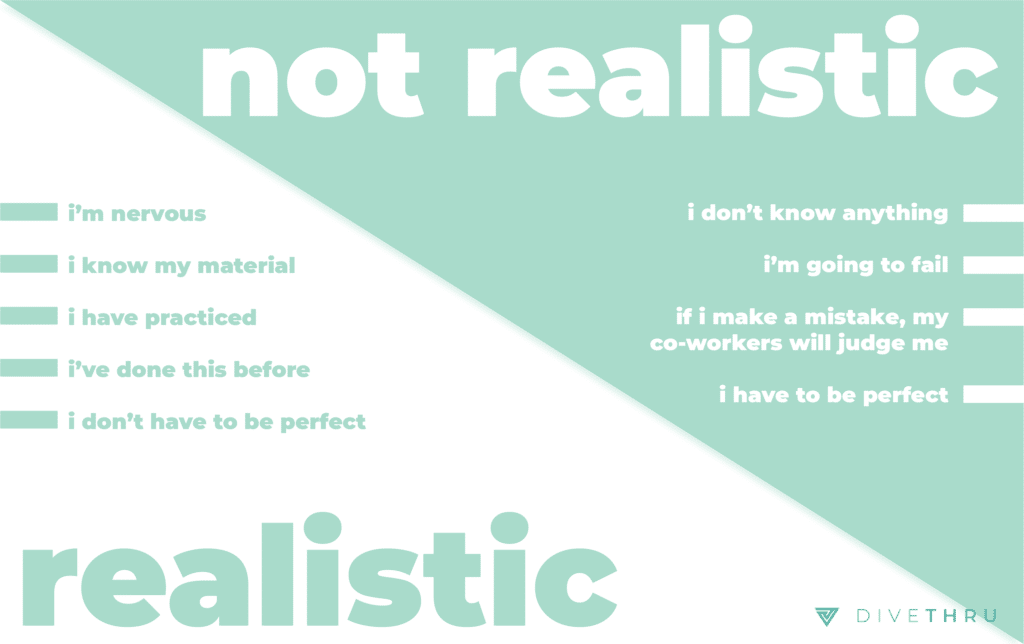It’s Tuesday night and after a gruelling day at work, all you want to do is watch Annalise Keating slay in a courtroom. While you wait for Netflix to load, you open up Instagram and start scrolling. Your feed is full of amazing successes – did your friend really complete an Ironman triathlon?? Wild, I could never do that. And another friend just started her own thrift shop?? Wasn’t that just a side hustle a week ago? Damn. She’s a badass entrepreneur…and wtf am I doing? Does that sound familiar at all? It’s time to find out how to stop comparing yourself to others because there is a never-ending feed on every. single. social. media. platform.
10 Realistic Ways to Stop Comparing Yourself to Others
The last thing we want is to set you up with a grand goal that’s easier said than done. We promise this isn’t another “just stop doing it” post. (because sure, we get it. why didn’t you think of that??)
Instead, let’s get real for a minute. We want to look at examples that actually happen in real life (disclaimer: these ones have literally ALL happened to us) and see if we can learn a thing or two together. Keep in mind that it’s a journey and the work to stop comparing yourself to others is never really done.
1. Be Aware of Your Triggers
Triggers are situations and stimuli that bring about a specific reaction. When we talk about triggers, we talk about the things that you know make you feel a certain way. For example, a trigger for anxiety could be too much caffeine. An example of an emotional trigger could be rejection. For some people, a trigger for self-worth could be driving through million dollar neighbourhoods, while for others the trigger could be brunching at very high-end restaurants with friends who earn way more. You see where we’re going with this?
Learn to identify your triggers and become aware of them. What happens to your thoughts and feelings when you scroll through social media? What aspects do you perceive as “success” in others that triggers your sense of worth? Who do you compare yourself to most often and why?
When you figure out what triggers you, you can work through those emotions more easily. You can also try to avoid those triggers altogether. Go easy on the caffeine, suggest a different brunch spot, and dude don’t even think about driving around those golf-course-backed properties…
2. Remind Yourself That Your Fears and Insecurities Are Universal
You’re actually perfectly normal in feeling this need to compare…it’s universal! It’s ingrained in the way we operate and the way the human mind works. The best thing we get out of it is the motivation to do more and achieve more, and even a boost to your self-esteem!
But the worst thing we get out of it is a feeling of inferiority. Like we’re less than and not enough and not worthy. This feeling can be so overpowering that we are writing a whole article about it.
Remind yourself that other people feel it too. We promise you that the people you see as perfect and successful have insecurities of their own. They compare themselves to the Jeff Bezos and Mark Zuckerbergs of the world and that also makes them feel like shit. Their fears of not being worthy enough and not being successful enough are as real as yours.
3. Your Social Media Feed Is Full of Distorted Realities
Repeat after us: social media is just a highlight reel. One more time, so that it really sinks in. Social media is just a highlight reel.
The perfectly incandescently happy posts you see on social media are just a snapshot of that person’s life. One moment in time that gets documented and posted. And maybe it really was a perfect moment where that person felt so much joy, they decided to share it with the world!
But there are also many struggles that we don’t see. Social media is a distorted reality where we won’t ever really get the full picture.
4. Repeat Your Priorities When You Start to Forget
You know you’re not a person who values money more than job satisfaction. You KNOW that and yet you still feel like shit when you hear how much more your friend earns. That envy eats away at you even though you would never actually work in that field.
This is a good time to think about your priorities! Make a quick list and jot down 3 or 4 things that you want in life more than anything. Focus on what it will take to achieve these goals and that should snap you out of it.
That pull towards validation is normal and if you catch yourself wrapped up in it, bring it back to your priorities.
5. Start Practicing and Living in Gratitude
There’s this thing that happens when you start to be actively grateful. It’s like a strong dose of happiness that goes right into your core and starts to shine throughout your whole body.
Start with 3 things, small or huge, that you’re grateful for every day. Write them down on any piece of paper you find laying around you. Use the leftover McDonalds napkins in your car if you have to.
Be aware of your focus as it shifts from what you don’t have, to what you do have. Gratitude journaling will make you rediscover the many many many things that bring you joy.
6. Shift the Focus Back to You
Shine the spotlight on your own achievements. Toot your own horn for a hot minute. Let’s bring the focus back to the hard work you’ve done to get to where you are.
If you’re a perfectionist, you often forget to celebrate the smaller milestones along the way because you’re so focused on getting to the finish line. Then you start comparing yourself to others and literally lose track of all the progress you’ve done. How productive!
Let’s end comparison to others by highlighting 3 goals you’ve achieved in the past month. Go.
7. Remember We Compare the Worst of Ourselves with the Best of Others
Here’s a new perspective for you, courtesy of author Joshua Becker. We look at others’ success through the lens of our own weaknesses.
That means we’ll compare what we assume is the “best” about someone else to our own insecurities that we feel strongly about. Have you noticed a general theme when you start comparing yourself to others? Is it when you see a post about a (presumed) happy long-term relationship? Is it when you see someone’s progress in the corporate world?
We’re also so much tougher on ourselves than we are on our friends. That harsh internal critic can leave us feeling discouraged, even before we begin comparing ourselves to others. The best cure we know for that is self-compassion, something you can work through with journaling.
Get started on your journaling practice by downloading the DiveThru app and checking out all of the free resources created by therapists. You’ll find hundreds of journaling and mindfulness exercises to choose from, including one on quieting your internal critic. And if you’re looking to create a daily routine instead, we’ve got you covered with one of our Dives!
8. Keep in Mind You Will Never Run Out of Things to Compare
Even if you succeed in changing this one thing about yourself that you think you need to, there will always be something to take its place.
Speaking from experience, it’s a constant battle of “improvement.” There’s always an extra 10 lbs you could shed. There’s always a new skin care routine with more expensive products that would give you that extra “glow.” And even if you achieve those two, there will likely be something else to take their spot: a newer car, a newer iPhone, you name it.
While dedication and drive can help you grow, comparing yourself to others along the way can hurt that progress. And it’s never ending so let’s nip the need to compare in the butt. The bud? We’ll go with butt because that’s saucier.
9. Use Your Past Self as a Benchmark to Compare
If you absolutely HAVE to compare, use your past self as a benchmark. This way, the only person you’ll be competing against is yourself and it’ll give you an idea of how much you’ve grown.
Thinking back to where we were 5 years ago, DiveThru wasn’t even born yet! And now we have a huge community of wicked awesome people who care about their mental wellbeing! Talk about growth! This is a comparison we can get behind.
10. Remember How Unique You Are
You hear this all the time but only because it’s so true. And your mothers will agree with us when we say you’re all special and unique and individually beautiful.
Not a single other soul is exactly like you.
This is perhaps our best tip in ending comparison to others because how can you argue with it? It doesn’t make sense to compare apples to oranges to doughnuts. We’re all different and we move at different paces, with different purposes.
And if you’re wondering, yes we’re the doughnuts. Cause we’re sweet AF.







